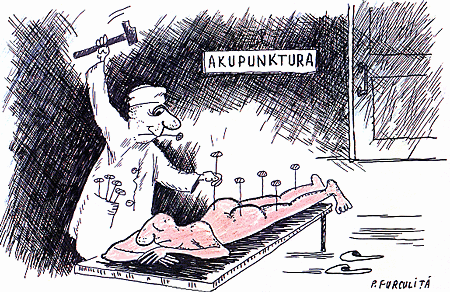pung-, punc-, punct-
(Latin: pungere, punctum to strike, to hit, to punch, to pierce, to puncture, to point, to sting, to bite; a dot, a mark; a point, a sharp point, a pinpoint)
These vocabulary roots have developed a confusing family of words which, on the surface, do not seem to be related; however, the entries in this unit really are derived from the roots and the meanings that appear in the headings of this unit.

2. As adapted in Western medicine, the needles may be twirled or be applied as a weak electrical current; Acupuncture is also called "stylostixis".
The quickest way to experience acupuncture is to try on a new shirt.
Acupuncture has its points.
Blunt words often have the sharpest edges.
Acupuncture is said to be a medical treatment that starts with being stuck with a needle and ends with being stuck with a medical bill.
Historical background of acupuncture
Acupuncture, the insertion of thin needles into specific points on the body in order to relieve pain or to treat illness, was developed in China more than four thousand years ago.
It is based on the idea that the body contains an essential life energy known as qi (CHEE), which flows in channels or meridians. It was believed that qi was made up of two varieties of energy, yin and yang.
In the human body, the male or yang elements indicate the capacity for "activity and transformation", while the female or yin characteristics are associated with "circulation, nourishment, and growth"; and the balance between them needs to be maintained.
The purpose of the acupuncturist is to remove barriers to the flow of qi and to restore the balance of yin and yang and such objectives are thought to be achieved by the placement of needles at certain positions on the surface of the patient's body.
2. To name a person for a specific role or post: Mrs. Thompson was formally appointed the head of the upcoming staff meeting.
3. In law, to direct the disposition of property by assigning an individual to take use of it: The estate was appointed to Jim's father by the law.
4. To furnish a place with equipment: The room was appointed with all the furnishings, chairs, and necessary lighting for the next formal gathering.
2. An arrangement between people to meet on a certain day and time; an engagement: When June looked at her calendar, she noticed that she had an appointment every week, either with a doctor or at the hairdresser's.
3. A position or a job; post; office; Mr. Smart took up the appointment of the head of the committee.
4. Fittings or furnishings (plural only): The fantastic appointments in the home were of the best quality and perfection.

